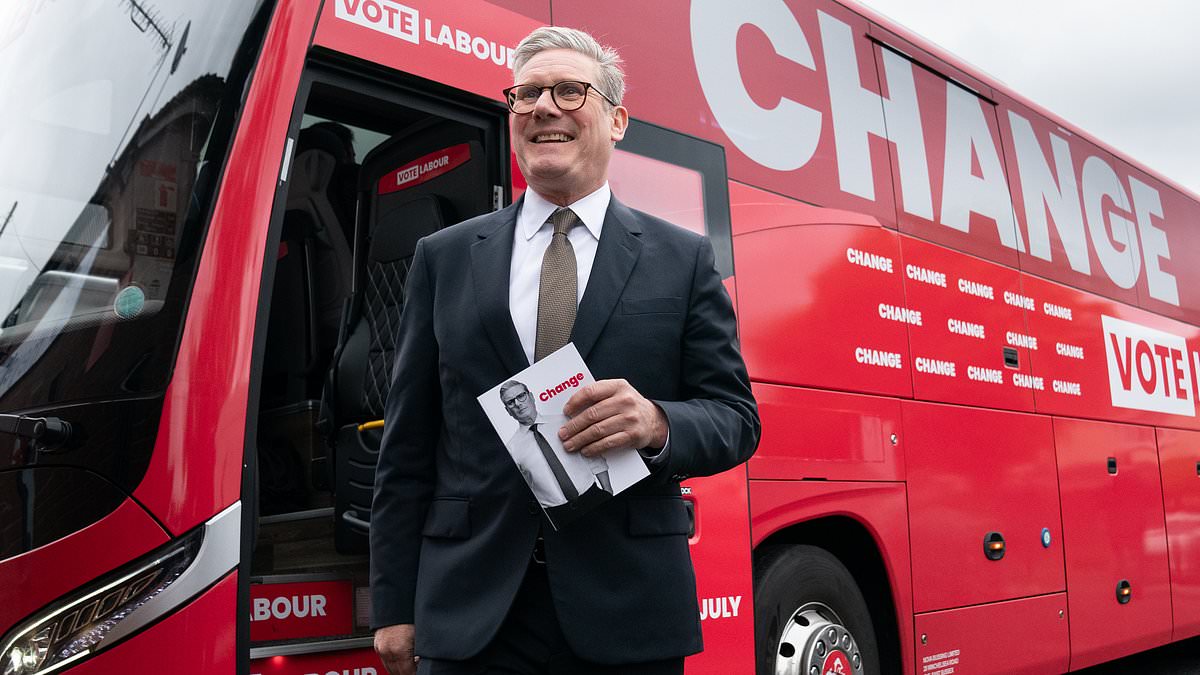The Tories stepped up attacks on Keir Starmer today warning that Labour could hike taxes in 18 areas.
Sir Keir unveiled his manifesto yesterday with plans to boost the burden by £8.5billion to pump money into services.
However, while promising no changes to income tax, national insurance or VAT, Sir Keir has refused to rule out moves on council tax and capital gains.
Treasury minister Laura Trott used a press conference to claim Labour ‘are secretly planning to put capital gains tax on your primary residence’, which would be a ‘disastrous policy for families up and down the country’.
Labour flatly denied that it would charge CGT on main home sales, accusing the Tories of ‘lying’.
But the Resolution Foundation has cautioned that the party’s manifesto set the stage for a Parliament of undeclared tax rises and public service curbs – a criticism also levelled at the Conservatives.
Ms Trott said: ‘Yesterday we saw a manifesto from Labour that contained no tax cuts, only tax rises – they even warned of it in their manifesto.’
Ms Trott added: ‘It’s a tax trap manifesto from a Labour Party that has tax rises coded into its DNA.
‘Labour’s first, second and third answer to every problem is always the same: raise taxes. And as a result, the tax burden under Labour – on their own figures – will rise to be the highest our country has ever seen.’
But a Labour spokeswoman said: ‘Labour will not introduce capital gains taxes on primary residences. It’s a bad idea.
‘The Conservatives are lying. It’s a sign of utter desperation that the Tories are talking about things they have imagined, and that Labour isn’t doing.’
1. The new State Pension being dragged into income tax for the first time in history.
2. Ending the 25 per cent tax free lump sum.
3. Making tax relief on pension contributions less generous.
4. Extending National Insurance to employer pension contributions.
5. Increasing the number of council tax bands.
6. Undertaking an expensive council tax revaluation as Labour have already done in Wales.
7. Cutting council tax discounts, as Labour is currently doing in Wales.
8. Applying Capital Gains Tax to family homes by ending Private Residence Relief.
9. Increasing the rate and level of Stamp Duty.
10. New levies or charges on bills while accelerating the rollout of renewables.
11. Increasing Capital Gains Tax.
12. Increasing Employers’ National Insurance.
13. Ending the Enterprise Investment Scheme.
14. Cutting or ending the Seed Enterprise Investment Scheme.
15. Ending Venture Capital Trusts.
16. Ending Business Asset Disposal Relief.
17. Ending Agricultural Property Relief and Business Relief.
18. Maintaining the expanded ULEZ zone in Outer London and expanding road pricing beyond London.
Ministers have been trying to get back on the front foot after a poll showed a ‘crossover’ moment with Reform leapfrogging the Tories.
Treasury minister Bim Afolami urged voted to focus on who should be PM between him and Keir Starmer, after YouGov research showed Nigel Farage’s insurgents in second place.
Although it is just one survey and had been widely anticipated, the result has fueled anxiety within Conservative circles about the campaign.
It also derailed the party’s efforts to nail Labour over tax plans after Sir Keir unveiled his manifesto yesterday.
The Resolution Foundation said: ‘Their current stance sets the scene for a Parliament of further tax rises, hard to deliver spending cuts, and the risk that a weaker productivity forecast from the OBR at the next fiscal event could force an incoming Labour chancellor into fresh hard choices in order to meet their stated fiscal rule of getting debt falling by the fifth year of the forecast.’
Labour’s pledges to increase public spending largely lie in departments that are already protected, such as health and social care and education, the Resolution Foundation said.
Paul Johnson, director of the Institute for Fiscal Studies (IFS), suggested that delivering ‘genuine change’ in Britain – Sir Keir Starmer’s flagship promise to voters – would require more funding than the policy document proposes.
Mr Johnson said some of Labour’s plans were better than ‘a shopping list of half-baked policy announcements’ – an apparent reference to the Tories’ offering – but warned it would need to put ‘actual resources on the table’.
‘And Labour’s manifesto offers no indication that there is a plan for where the money would come from to finance this,’ he said.
In a response to Sir Keir’s launch of the policy document on Thursday, the IFS director said: ‘This was not a manifesto for those looking for big numbers. The public service spending increases promised in the costings table are tiny, going on trivial – the tax rises, beyond the inevitable reduced tax avoidance, even more trivial.
‘On current forecasts, and especially with an extra £17.5 billion borrowing over five years to fund the green prosperity plan, this leaves literally no room – within the fiscal rule that Labour has signed up to – for any more spending than planned by the current government, and those plans do involve cuts both to investment spending and to spending on unprotected public services.’
Mr Farage has gloated that he is now in charge of the main opposition, hammering home the point in an ITV debate nast night and interviews this morning.
